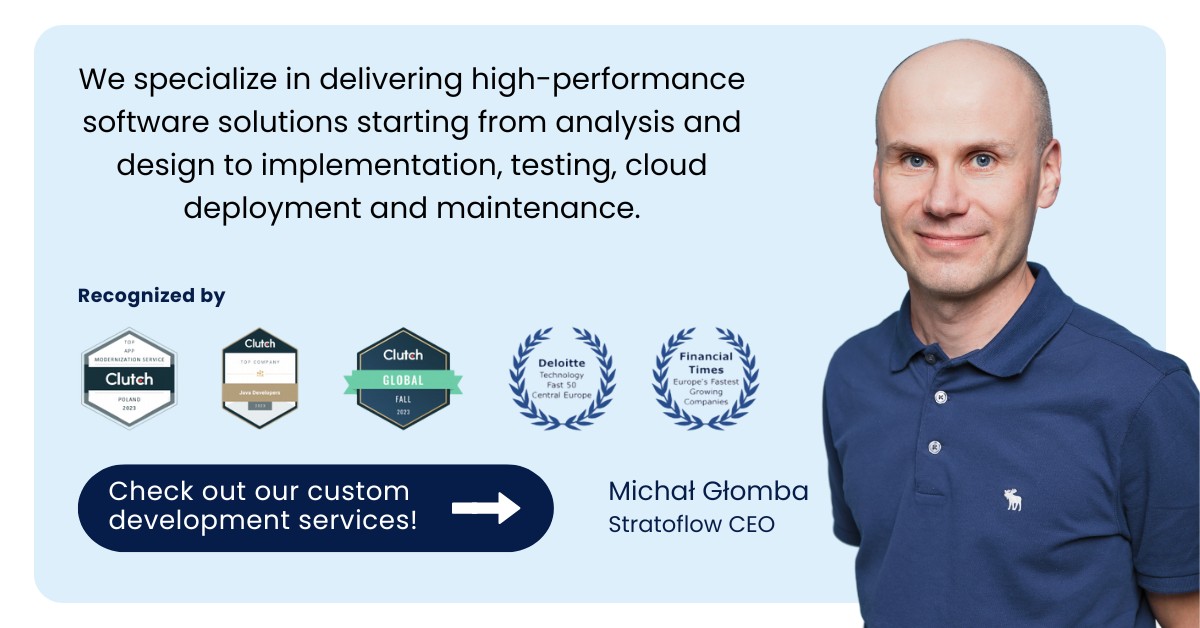
What You Need to Know About Custom Software Development in 2024
Today’s digital world is all about personalization.
Everything made to measure and tailored to each user individually.
This philosophy applies to enterprise systems as well, where companies invest in solutions tailored to their specific business needs to gain a competitive edge. Let’s take a closer look at these software products, what sets them apart, and what it takes to build such a system for your company.
Contents
Key Takeaways
- Custom development is the process of creating tailored software applications to meet unique business needs.
- It offers enhanced security, scalability and adaptability benefits for businesses.
- When selecting a custom software partner, evaluate their experience and expertise, communication skills and pricing models to ensure successful project execution.
Understanding custom development
From a purely technical standpoint, custom development refers to the process of creating software applications tailored to meet the specific needs of a business, providing advantages over pre-existing solutions.
This approach allows companies to develop software that is uniquely designed to address their particular challenges, offering a level of customization and flexibility that simply cannot be achieved with off-the-shelf software.
If you want to initiate a custom software development project that would require collaborating with software developers who can guide you through this multi-step process.
If you choose this collaboration model it will ensure that the software that you end up with is suited specifically to the needs of your business and is buold according to all best practices and software development standards.
[Learn: Off the shelf vs custom software: pros & cons + examples]
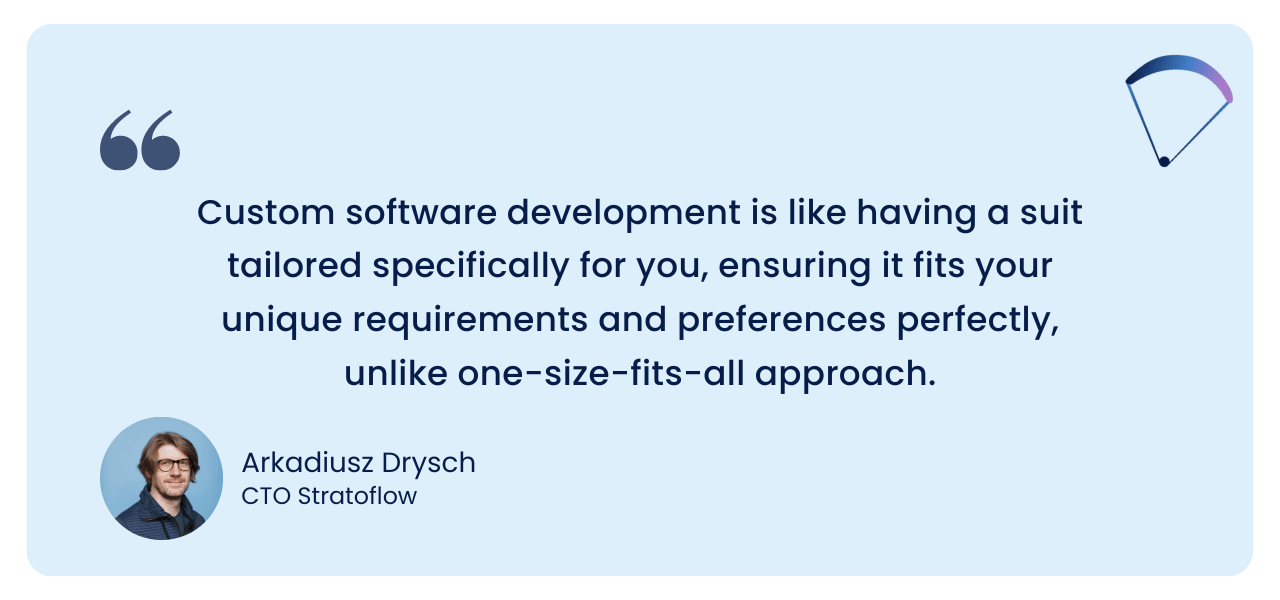
Defining custom software development
At its core, custom software development is a process that involves a lot of subsequent stages: from designing and planning, through building and deploying, all the way to post-deployment updates and maintenance.
Only by completing these steps, the applications can be specifically tailored to address the unique needs and requirements of your business.
The end goal is simple yet profound: to provide a powerful and tailored custom software solution that offers a seamless user experience.
Bespoke vs. Custom Software
While the terms “bespoke software” and “custom software” are often used interchangeably, they both refer to software solutions specifically designed for a particular business or organization.
Custom software development concentrates on crafting software that is distinctively designed to fulfill the peculiar needs and challenges of a business, delivering a degree of customization and flexibility unattainable with ready-made solutions.
In essence, both bespoke and custom software offer personalized solutions that help businesses overcome their unique challenges and achieve their goals more efficiently.
Benefits of custom development for businesses
Custom software development comes with many benefits for your business.
Some of the key advantages of custom software development include:
- Meeting unique business needs
- Decreasing cost of development compared to in-house teams
- Offering scalability and adaptability to accommodate business growth and changing requirements
Let’s explore these benefits together to have a holistic comprehension of the advantages custom software development can offer your business.
Meeting unique business needs
One of the most significant benefits of custom software development is its ability to address specific business requirements, providing personalized solutions that off-the-shelf software may not offer.
Working hand in hand with a capable software developer enables businesses to craft custom software that fine-tunes operations, makes workflows more efficient, and garners a competitive edge in the market.
This level of customization allows companies to create software that is tailored to their individual needs, ensuring a seamless user experience and increased efficiency in their day-to-day operations.
Cost Optimization
Outsourcing custom software development to an external team presents a great opportunity to optimize the costs of your projects.
Relocating software development to countries with lower average wages like Poland can present a significant opportunity for optimizing the costs of custom software development, as highlighted by research from Yegor Denisov-Blanch of Stanford University.
In his research, he analyzed a case of a US-based company restructuring a development team by replacing 42 high-cost Bay Area engineers with 41 developers in Poland, along with a small team in India. This change resulted in reducing annual engineering costs from $12.3 million to $7.4 million, while maintaining nearly the same level of productivity after just six months.
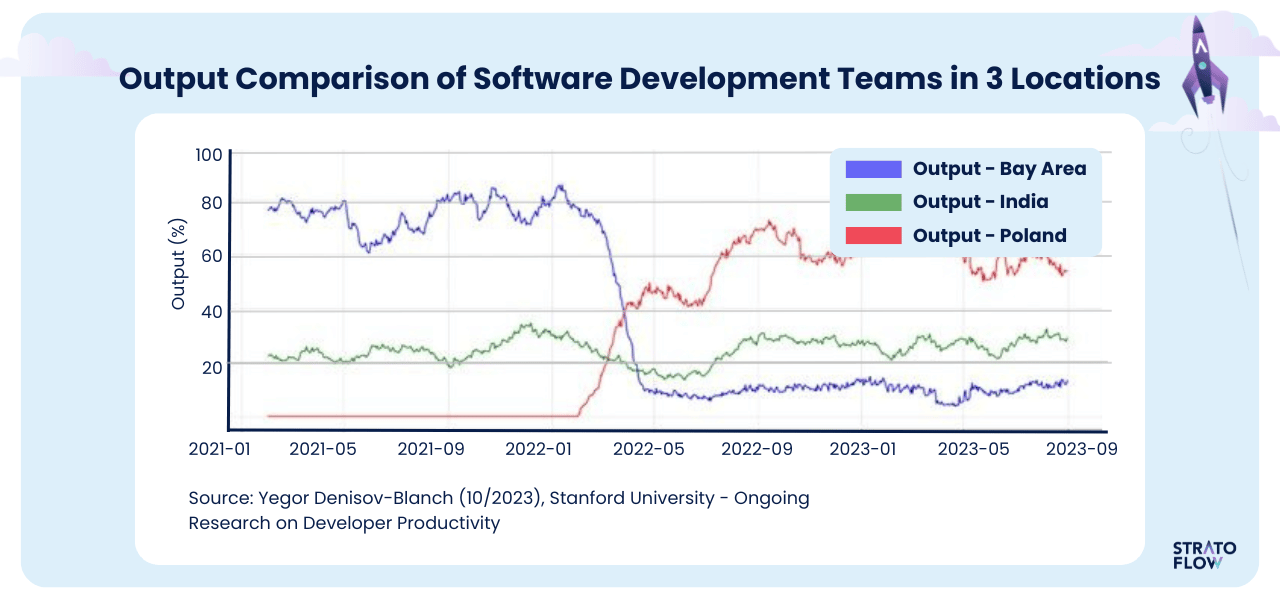
This data shows that if you are looking to start a custom software development project outsourcing to a foreign market might be an excellent opportunity to optimize the costs of your operations without having to sacrifice performance and productivity.
But custom software development not only offers immediate cost savings through strategic team relocation, but it also serves as a long-term solution for decreasing operational costs.
By designing software that is tailored specifically to your company’s workflows, you can streamline processes, automate repetitive tasks, and reduce dependency on manual interventions, ultimately boosting efficiency.
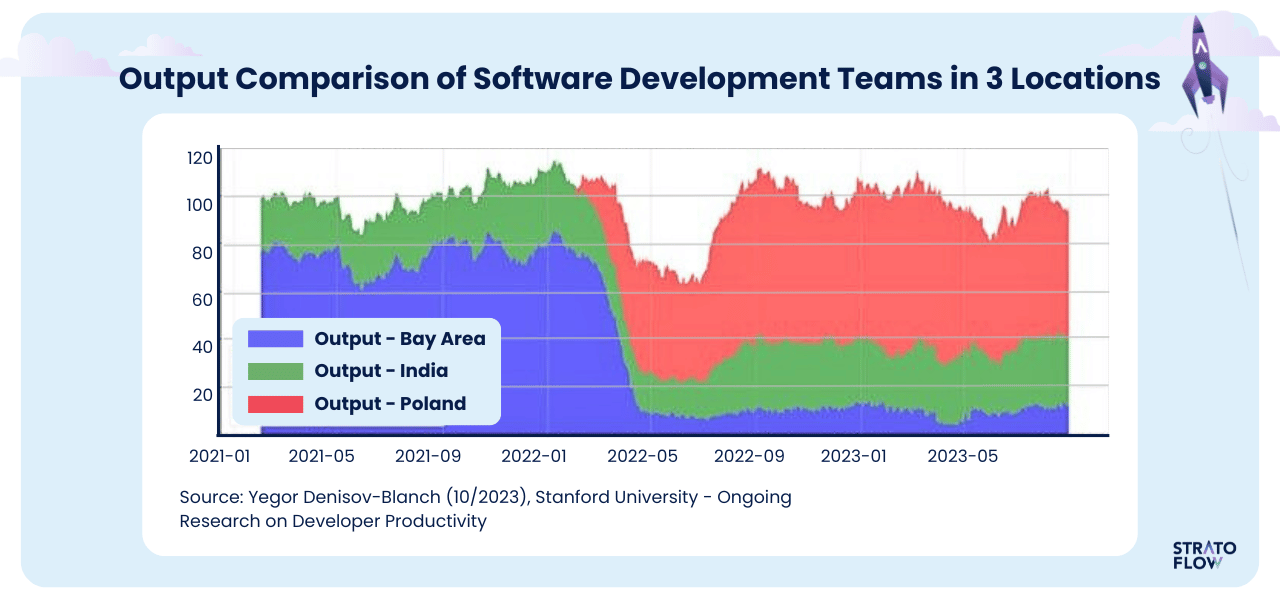
Scalability and adaptability
Custom software development empowers you with scalability and adaptability, ensuring your software grows and evolves with your business needs.
By designing software with scalability in mind, you can ensure that your software architecture can handle increased workloads and user demands without compromising performance or functionality.
In addition, custom software can be easily modified and upgraded to accommodate evolving requirements, guaranteeing long-term scalability and adaptability for the business.
This flexibility allows companies to respond quickly to changing market conditions, ensuring that their software remains relevant and effective in the face of new challenges
Types of custom software solutions
As your businesses grow and evolve, different types of custom software solutions may be required to address their unique challenges and requirements.
Custom software development can encompass a wide range of solutions, from enterprise applications and mobile apps to industry-specific solutions (i.e. custom time management tool, accounting software, or insurance policy management software).
Understanding the various types of custom software solutions available can help businesses make informed decisions about the best approach.
[Read also: What are Financial Management Systems: Best Tools to Choose From in 2023]
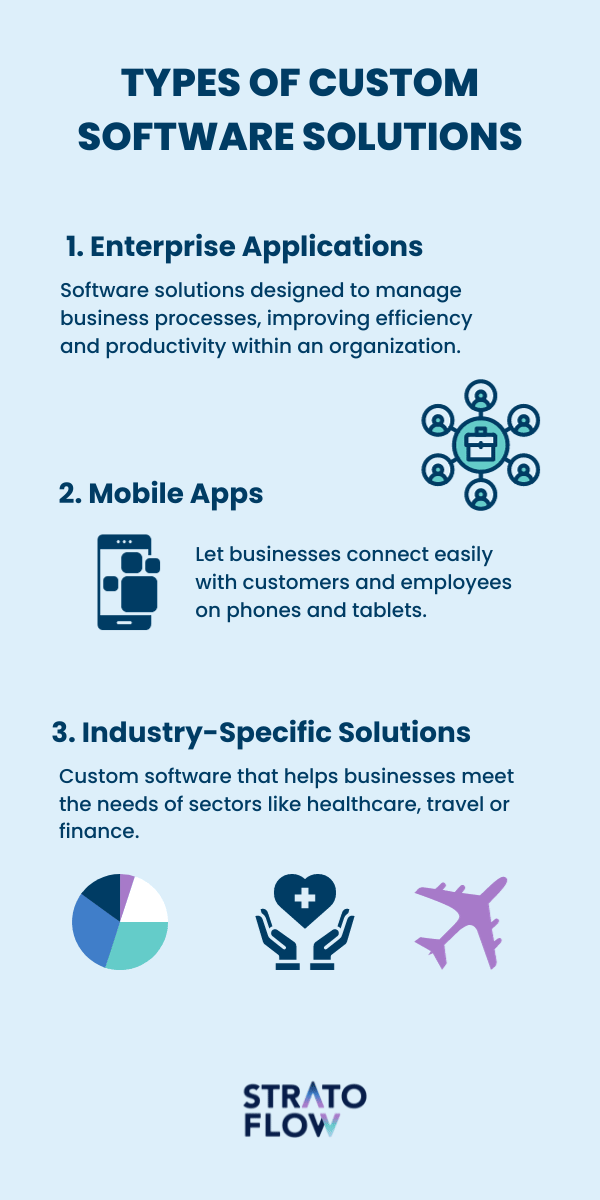
Up next, we’ll delve into the most commonly utilized types of custom software solutions, highlighting their potential advantages for businesses across a wide spectrum of industries.
[Explore our custom software solutions for the Travel, Ecommerce, and Fintech industries.]
Enterprise applications
Enterprise applications are software solutions designed to manage and streamline business processes, improving efficiency and productivity within an organization.
These applications can help businesses optimize their operations, facilitate communication and collaboration among team members, and provide a centralized platform for managing data and resources.
By leveraging custom enterprise applications, you can gain greater control over processes and data, ensuring that your software systems are optimized for maximum efficiency and effectiveness.
One notable example of a custom enterprise applications is a project we developed for a fintech company.
We created a cutting-edge, high-performance SaaS finance system tailored to meet the specific needs and challenges of the financial sector. This custom enterprise application not only streamlined the company’s operations but also enhanced its data management and analytical capabilities. You can explore the specifics of this project and the impactful results it delivered by visiting our case study.
[Read also: In-Depth Guide to Accounting System: Definition, Types and Ideas for Custom Solutions]
Mobile apps
Mobile apps offer businesses a way to engage with customers and employees on the go, providing a seamless user experience across a variety of devices.
With the increasing prevalence of smartphones and tablets, mobile apps have become a crucial tool for businesses looking to expand their reach and visibility.
By developing custom mobile apps, you can:
- Offer a consistent user experience across multiple platforms
- Increase customer engagement
- Establish a stronger presence in the mobile market.
Industry-specific solutions
At last, we have to talk about industry-specific solutions – custom software applications designed to address the unique challenges and requirements of specific sectors, such as healthcare, finance, or retail.
By developing custom software tailored to the needs of a particular industry, you can ensure that their systems are optimized for the unique demands and regulations of their sector.
This level of customization can help businesses streamline operations, improve efficiency, and gain a competitive advantage in their respective industries.
A practical example of an industry-specific solution, particularly for the e-commerce industry, is a project we executed for a physical gold distribution company. We developed a real-time pricing engine, enabling them to manage intraday gold price fluctuations across multiple sales channels. This custom solution ensured accurate, real-time pricing and margin management, minimized mispricing events and human errors, and became pivotal in controlling their omnichannel revenue stream.
Learn more in our case study.
The custom software development process
The custom software development process involves several stages from the initial requirements gathering and analysis to the final deployment and ongoing maintenance of the software. Each step equally important.
Understanding every phase of the custom software development process empowers businesses to effectively manage their projects, ensuring a smooth and efficient development journey.
Now, we’ll explore each stage in details, providing insight into the steps involved in designing, building, and maintaining a successful custom software solution.
Note: the software development process may vary depending on the methodology. To learn more about the most popular development methodologies, check out this article: Top Software Development Methodologies: How to Choose the Right?

Requirements gathering and analysis
Gathering and analyzing requirements is the first step in the custom software development process, laying the foundation for the successful development of the software.
During this stage, the development team works closely with the client to understand their:
- needs,
- objectives,
- expectations for the software.
By carefully considering these factors, the team can create a detailed project plan that outlines the scope, development methodology, programming language, timeline, tech stack, and resources required to deliver a custom software solution.
This stage is pivotal in aligning the final product with the client’s needs and expectations.
[Read also: How to prepare for outsourcing software development]
Design and architecture
The design and architecture stage of the custom software development process involves:
- Creating a blueprint for the software
- Choosing programming language and supporting technologies like Kafka, Oracle Coherence, and Hazelcast.
- Outlining its structure, features, and user interface
- Designing the software to cater to the particular needs of the business
- Ensuring an uninterrupted user experience
This stage plays a key role in the development process.
By working closely with the client and incorporating their feedback, the development team can create a design that is both functional and visually appealing.
In addition, the architectural design of the software helps to ensure that it is built on a solid foundation, with a clear understanding of how all the components fit together and interact with one another.
Development and testing
Once the design and architecture have been established, the development phase and testing stage of the custom software development process begins.
During this phase, the development team writes the code for the software, ensuring that it functions correctly and meets the established quality standards.
This stage is crucial to ensure that the software functions as planned and delivers a smooth user experience. Thorough testing is essential to identify and address any potential issues, such as bugs or security vulnerabilities, before the software is deployed. By prioritizing testing and quality assurance, businesses can minimize the risk of software issues and potential downtime.
Deployment and maintenance
The final stage in the custom software development process is deployment and maintenance. It’s a key software development task that often is overlooked. During this phase, the software is launched and integrated into the business’s existing systems and processes.
Once the software has been deployed, the development team provides ongoing support, ensuring that any necessary updates and improvements are made as needed.
This stage is critical in ensuring that the software stays current and operational, aiding businesses in retaining a competitive edge in the market. By providing proper documentation and training for users, businesses can ensure that their custom software is effectively utilized and maintained, optimizing the value of their investment.
[Read also: How to prepare a software development agreement]
Tips for choosing a custom software development company
Choosing the right custom software development company is a crucial decision for businesses looking to invest in custom software solutions.
By partnering with a skilled and experienced development team, businesses can ensure that their software projects are managed effectively and deliver the desired results.
To help you make the right choice, we’ve compiled some tips for evaluating a custom software development company’s experience, communication skills, and pricing models.
By considering these factors, you can ensure that you select the right partner for your custom software development project and achieve the best possible outcome for your business.
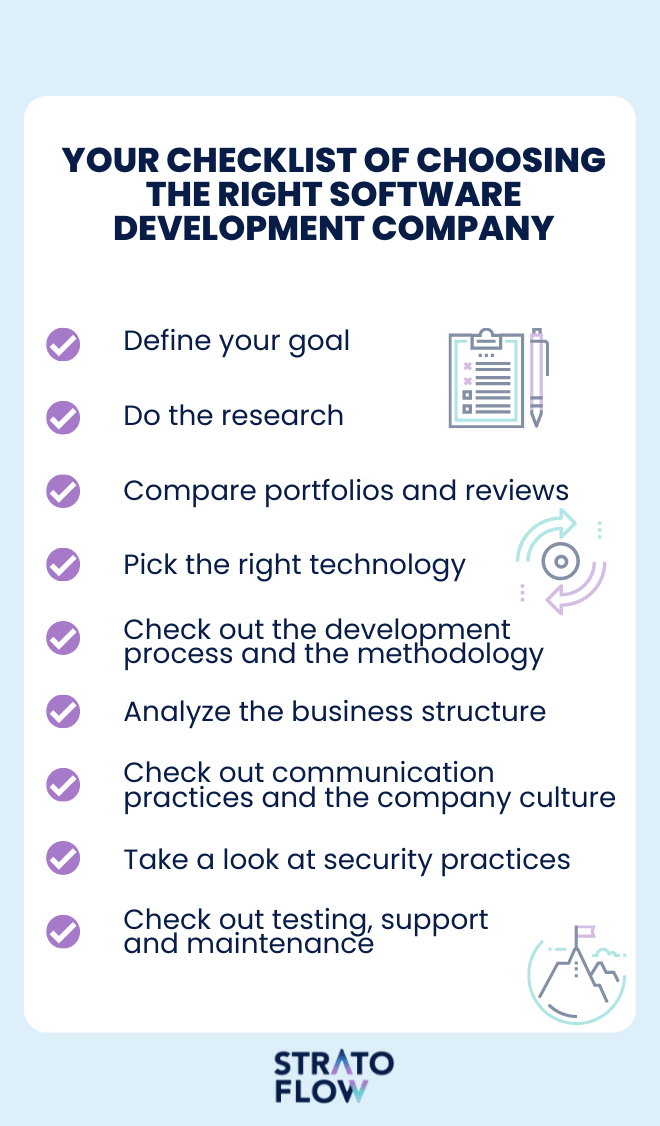
Evaluating experience and expertise
Evaluating the experience and expertise of a custom software development company is crucial when making a decision.
Look for a company with a proven track record of delivering successful custom software projects (tip: use Clutch to check companies’ reviews) and a team of experienced professionals who can effectively manage the development process and work according to the agile software development methodology.
Working with a skilled and dedicated development team ensures the smooth execution of custom software projects, leading to the desired outcomes.
Communication and collaboration
Effective communication and collaboration are essential for a successful custom software development project.
When considering a custom software development company, ensure they can effectively communicate their ideas and solutions, and have a solid understanding of your needs and requirements.
A strong working relationship between the custom software company and the client is crucial in a successful project.
Pricing models and project management
Finally, consider the company’s pricing models and project management approach when selecting a custom software development partner.
Opt for a company that offers flexible pricing models and is transparent about their costs, ensuring that you can budget effectively for your project and optimize. We have prepared a detailed guide on: how to estimate the cost of software development.
Additionally, evaluate the company’s project management capabilities, ensuring that they have a structured and organized approach to managing the development process.
By selecting a company with a strong project management framework, you can ensure that your custom software project is executed efficiently and effectively.
Common mistakes to avoid in custom software development
Custom software development, like any complex project, can run into several common challenges.
It’s important for your business to recognize potential pitfalls in custom software projects. Being aware of these risks helps you navigate the process more smoothly and achieve better results.
Here, we’ll explore some of the most frequent mistakes in custom software development and provide practical advice on how you can avoid them.
Unclear goals and requirements
One of the most common mistakes in custom software development is having unclear goals and requirements.
If you don’t understand the desired outcome and specific requirements for the software, it can be difficult for the development team to create a desirable solution.
To avoid it, it’s crucial to set clear goals and requirements at the beginning of the project.\
This includes:
- defining the scope of the project,
- identifying the target users,
- outlining the key features and functionality of the software.
Insufficient testing and quality assurance
Another frequent mistake in custom software development is not putting enough focus on testing and quality assurance.
When you skip thorough testing, you risk encountering bugs, security flaws, and other problems that can lead to downtime and costly financial losses.
To prevent these issues, make sure you prioritize comprehensive testing and quality assurance at every stage of the development process.
This includes:
- Conducting regular code reviews
- Performing rigorous testing
- Employing automated testing tools to ensure that the software functions correctly and meets established quality standards.
Inadequate documentation and training
Finally, poor documentation and lack of training can create confusion and make it difficult for your team to maintain the software after deployment.
Clear documentation gives your users the instructions they need, while proper training ensures they know how to use the software effectively.
To avoid this common mistake, make sure you provide thorough documentation. This way, your users will have the knowledge and skills needed to make the most of the software.
Custom software development – key statistics
The value of custom software development is also shown in research conducted by various reputable organizations.
Here are a couple of examples:
- According to a survey by Software Advice, 86% of business decision-makers said that custom software development is important for their company’s success.
- Gartner report shows that custom software development can generate an average return on investment (ROI) of 15 times, compared to 3 times for off-the-shelf software.
- According to a IBM study, custom software development can reduce operational costs by 30%, increase revenue by 20%, and improve customer satisfaction by 40%.
- According to a SOLTECH study, custom software development can help businesses achieve competitive advantages, such as innovation, differentiation, and efficiency.
Summary
Custom software development offers a powerful solution for businesses looking to gain a competitive edge in today’s rapidly evolving market. By investing in custom software solutions, companies can address their unique challenges and requirements, enhance security and control, and enjoy the scalability and adaptability needed to thrive in an ever-changing business landscape. By carefully selecting the right custom software development partner and avoiding common mistakes, businesses can maximize the success of their custom software projects and achieve the best possible results. As you embark on your custom software development journey, remember that the right approach, coupled with the right partner, can make all the difference in unlocking your business’s full potential.
Related Posts
Thank you for taking the time to read our blog post!
Frequently Asked Questions
What is custom design and development?
Custom design and development is the process of creating tailored solutions to fit a specific business need, such as a website or app. It involves defining requirements, designing, developing, and deploying the custom product to achieve the desired outcome.
Why choose custom development?
Custom software development offers organizations the unique benefit of tailored solutions designed specifically to meet their specific requirements. This allows for greater flexibility, improved productivity, and increased scalability to fit changing needs. The alternative of off-the-shelf software is often inefficient or inadequate for these purposes.
What is the disadvantages of custom development?
Custom development can be costly and time-consuming to implement, with associated upfront costs and technical proficiency needs. This can have a negative impact on an organization’s productivity, finances, and efficiency.
What are the main benefits of custom software development for businesses?
Custom software development offers tailored solutions that meet unique business needs, greater security and control, as well as scalability and adaptability to accommodate business growth.
How does custom software development differ from off-the-shelf software?
Custom software development provides a level of customization and flexibility that off-the-shelf solutions cannot, allowing businesses to tailor the software to their specific needs and challenges.
